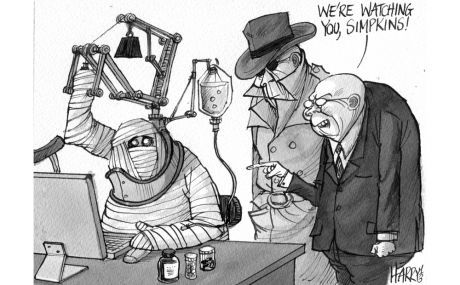Reports
You are here
Public service workers and the fight to defend sick leave

October 7, 2014
On September 30, about 70 people crowded into a community centre meeting room in Ottawa to hear three speakers discuss the topic of employer attacks on sick leave. The event was organized by the Public Service Caucus of Solidarity Against Austerity.
To take one example, the federal government has tabled a proposal to gut federal workers' sick leave. The current system has two weeks of bankable leave, which many workers rely on when they get older and may need extra sick time. But the Tories want to replace it with five days of sick leave followed by a seven day period of unpaid sick leave; and a short-term, privately-run disability insurance plan which would pay 70 per cent of wages and would allow the private provider to override doctor's advice.
To many, these attacks are almost unbelievable in their viciousness because sick leave seems like such a basic right. But, as the panelsits and those who intervened during the discussion emphasized, the right was not handed to us—it was something we had to fight for and win.
Pauline Hopley, President of Canadian Union of Public Employees (CUPE) Local 1764, Durham Region municipal workers, presented on how her union went on strike for the first time in 40 years, and managed to defend a vulnerable group of workers—paramedics—from the employer demand to impose a three-day unpaid sick leave period. In the end, they won gains because now paramedics can bank their sick leave—an element that others in the union had, and still have, but which was not granted to paramedics when they were first rolled into the union several years ago.
Mike Palecek of the Canadian Union of Postal Workers (CUPW) spoke eloquently about the impact on CUPW members of having lost sick leave in the last round, due to a decision—facing back-to-work legislation—not to let the government force the bad deal down their throats. Instead, they decided to take a bad deal voluntarily, and the result was a private insurance-based plan similar to the one proposed by the federal government in the current round of bargaining with federal public sector workers. Palecek shared heart-wrenching stories of members who could not get the insurer to recognize that getting chemotherapy is a reason to miss work, or whose doctor was treating them for post-childbirth complications and ordered them to stay at home.
Emmanuelle Tremblay, President of Local 516 of Canadian Association of Professional Employees (CAPE) at Foreign Affairs, Trade and Development Canada and candidate for National President of CAPE, spoke about how she and others are working from the bottom up to mobilize members, step by step, building workers' confidence in the effectiveness of collective action.
The lessons: We need to start working right now to break down the divide-and-conquer barriers the employers set up between people. We need to do it in a fundamentally more democratic way than most unions currently use, if they mobilize at all. We need to make sure people know we are fighting, not just for our own sick leave, but for the right of all workers to decent sick leave. And, crucially, it's better to fight and lose than lie down and lose, because then you can possibly win in the next round.
Section:









